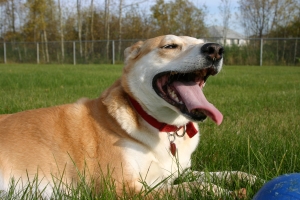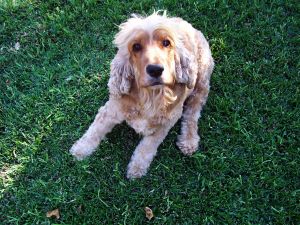By nature your dog does not smell all-together good. From his fur to his mouth, all sorts of foul emits from your four-legged friend, whether you care to admit it or not. And while we all want to improve our dog’s breath for our own peace of mind, in actuality, if left untreated, a dog’s bad breath could lead to something worse. Here are 5 ways to improve your dog’s breath while making sure he’s not suffering from other health issues.
1. Do a regular checkup – It’s crazy to realize that bad breath could be caused by a simple piece of food lodged in your dog’s teeth. He has no access to floss or mouthwash, so you have to help him out. Check his mouth regularly for any lingering food objects and wash them away. On a more serious note, however, this checkup can also help you determine if your dog has a tumor growth, which will also give off a smell. Obviously if you find an inexplicable growth, see your vet.
2. Brush your dog’s teeth, daily – Not once a month, not once a week, but daily. You can use a doggie toothbrush or even a thimble-like brush you stick on your thumb (my favorite). Plaque starts at the upper teeth, so get in good there, and brush your dog’s tongue since smelly bacteria make camp there. Be sure not to use human toothpaste. That’ll get your dogs sick. Your dog may not love the idea of this chore at the start, but he’ll get over it. Especially if you introduce him to it slowly over a few days, keep calm while performing the task, and use a flavored toothpaste (like peanut butter) that he likes (ps. – people floss their dogs’ teeth, too, you know. Yeah, good luck with that one).
3. Do the chew – You know how your dog chews sticks outside? While that may scare and annoy you (and, we should add, it can definitely be dangerous), it actually helps clean your dog’s teeth. So, use a substitute – chew toys. Better yet, mix and match your poisons by adding some flavored toothpaste to a Kong or other toy. Rawhides work wonders on plaque, by the way.
4. Use breath fresheners – Greenies are the most popular, although Dentastix work too. There’s controversy around these treats because some dogs can choke on them, but dogs can choke on anything, if you think about it. I have a dog who swallows the Greenies whole, which not only scares the bejesus out of me, but completely eliminates any potential good the treat could offer. So, here’s what I do, I give him the treat is small segments. Greenies aren’t the friendliest treats to break apart, but it’s worth the effort.
5. Get a professional cleaning. Sometimes your dog’s bad breath has gone too far, and you need to get professional help. If you don’t, your dog’s teeth might not make it to old age, and the bacteria build up could cause other health issues down the line. Professional cleanings are not like the ones we have as humans. You might not like the dentist, but a dog’s dental cleaning is far more aggressive, and frightening for your dog. That’s why any real and thorough cleaning that’s safe for your dog includes anesthesia. There are “anesthesia-free dental scaling” procedures, but the American Veterinary Dental College (the preeminent figurehead of your dog’s teeth) does not endorse that practice.
We may assume that bad doggie breath is just a part of life, but it doesn’t have to be. By using the methods listed above, as well as offering your dog a balanced diet that’s not overly loaded with meat, your pet doesn’t have to have breath with a bite.






